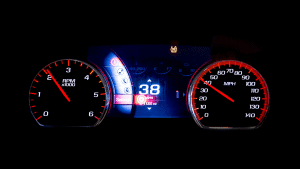What is Good Gas Mileage? 10 Evil Factors That Affect Your Vehicle’s MPG
Gas mileage, also known as miles per gallon (MPG), is a critical factor when it comes to purchasing a vehicle.
With fluctuating gas prices and growing environmental concerns, many people are asking, “What is good gas mileage?”
In this article, we will explore what is a good gas mileage and…
The top 20 factors that affect your vehicle’s MPG, helping you make informed decisions when purchasing a vehicle and maximizing your fuel efficiency.
What is Good Gas Mileage?
Good gas mileage is a measure of how far a vehicle can travel on a specific amount of fuel. It is typically expressed in miles per gallon (MPG) in the United States.
The higher the MPG, the more fuel-efficient the vehicle is, meaning it can travel greater distances using less fuel.
Determining what constitutes good gas mileage can vary depending on the type of vehicle and its intended use.
For smaller vehicles like compact cars and sedans, good gas mileage is typically considered to be around 30 MPG or higher.
Good gas mileage is generally around 25-30 MPG for midsize and large cars.
For larger vehicles like trucks and SUVs, good gas mileage can range from 17-26 MPG, depending on the size and weight of the vehicle.
Gas mileage, also known as fuel efficiency, is a critical factor when it comes to purchasing a vehicle.
With fluctuating gas prices and growing environmental concerns, many people are asking, “What is good gas mileage?”
What is a good gas mileage, and why it’s important?
When determining what constitutes good gas mileage, it’s important to consider the type of vehicle and its intended use.
For example, a small, fuel-efficient car may be ideal for commuting and city driving, while a larger vehicle may be necessary for hauling cargo or transporting a family.
In these cases, good gas mileage may be relative to the vehicle’s size and intended use.
It’s also important to note that gas mileage can vary depending on driving conditions, such as traffic, terrain, and weather.
For example, driving in heavy traffic or on hilly terrain can reduce gas mileage, while driving on flat, open roads can improve fuel efficiency.
Similarly, extreme weather conditions, such as extreme heat or cold, can impact gas mileage.
Ultimately, what constitutes good gas mileage will depend on your individual needs and preferences.
When purchasing a vehicle, consider factors such as size, fuel efficiency, and intended use, and choose a vehicle that meets your needs and budget.
By implementing strategies to improve fuel efficiencies, such as regular maintenance, proper tire inflation, and route planning, you can achieve optimal gas mileage and save money on gas while reducing your environmental impact.
Why is Good Gas Mileage Important?
Good gas mileage is important for several reasons. First, it can save you money on gas.
The more fuel-efficient your vehicle is, the less money you will spend on gas over time.
Second, good gas mileage can reduce your environmental impact.
Vehicles that consume less fuel produce fewer emissions, which can help reduce air pollution and greenhouse gas emissions.
Finally, good gas mileage can improve your vehicle’s performance and longevity. Vehicles that are well-maintained and run efficiently tend to last longer and require fewer repairs over time.
Top 10 Factors That Affect Your Vehicle’s MPG
We’ve just explored what is good gas mileage…
Read on to know the factors that affect mileage:
1. Vehicle Weight
The weight of your vehicle is one of the most significant factors that affect gas mileage. Heavier vehicles require more energy to move, which can result in lower gas mileage. Lighter vehicles, on the other hand, generally have better fuel efficiency. When purchasing a vehicle, consider the weight of the vehicle and how it will impact your gas mileage.
2. Aerodynamics
The shape and design of your vehicle can also impact gas mileage. Vehicles with a more streamlined design experience less air resistance, which can lead to better fuel efficiency. When purchasing a vehicle, consider the aerodynamics of the vehicle and how it will impact your gas mileage.
3. Engine Size
The size of your vehicle’s engine can also impact gas mileage. Larger engines typically consume more fuel than smaller engines. Vehicles with smaller, more efficient engines often have better gas mileage. When purchasing a vehicle, consider the size of the engine and how it will impact your gas mileage.
4. Transmission Type
The type of transmission your vehicle has can also impact gas mileage. Vehicles with manual transmissions often have better gas mileage than those with automatic transmissions. When purchasing a vehicle, consider the type of transmission and how it will impact your gas mileage.
5. Driving Habits
Your driving habits can significantly impact gas mileage. Aggressive driving, such as rapid acceleration and hard braking, can significantly reduce gas mileage. Maintaining a steady speed and avoiding sudden stops and starts can help improve fuel efficiency. When driving, consider your habits and how they impact your gas mileage.
6. Tire Pressure
The pressure of your tires can also impact gas mileage. Properly inflated tires can improve gas mileage by up to 3%. Check your tire pressure regularly and inflate them to the recommended level. When driving, consider the pressure of your tires and how it impacts your gas mileage.
7. Fuel Type
The type of fuel your vehicle uses can impact its gas mileage. Vehicles that run on diesel or hybrid engines often have better fuel efficiency than those that run on gasoline. When purchasing a vehicle, consider the type of fuel it uses and how it will impact your gas mileage.
8. Vehicle Maintenance
Regular maintenance, such as oil changes, tire rotations, and air filter replacements, can help keep your vehicle running efficiently and improve gas mileage. When owning a vehicle, consider the maintenance schedule and how it impacts your gas mileage.
9. Route Planning
The route you take when driving can impact gas mileage. Avoiding traffic and taking the most direct route can help reduce the amount of fuel your vehicle consumes. When driving, consider the route you take and how it impacts your gas mileage.
10. Climate Control
Using your vehicle’s air conditioning or heating system can reduce gas mileage. Use these systems sparingly to improve fuel efficiency. When driving, consider the use of climate control and how it impacts your gas mileage.
11. Fuel Additives
Using fuel additives can help improve gas mileage by cleaning the engine and fuel system, reducing friction, and improving combustion efficiency. When owning a vehicle, consider the use of fuel additives and how they impact your gas mileage.
12. Vehicle Age
The age of your vehicle can impact gas mileage. Older vehicles may have lower gas mileage due to wear and tear on the engine and other components. Regular maintenance can help improve gas mileage in older vehicles. When owning a vehicle, consider the age of the vehicle and how it impacts your gas mileage.
13. Driving Conditions
Driving in heavy traffic, on hilly terrain, or in extreme weather conditions can reduce gas mileage. Plan your route and driving schedule to avoid these conditions when possible. When driving, consider the conditions you are driving in and how they impact your gas mileage.
14. Vehicle Size
The size of your vehicle can impact gas mileage. Larger vehicles, such as trucks and SUVs, typically have lower gas mileage than smaller vehicles like compact cars and sedans. When purchasing a vehicle, consider the size of the vehicle and how it impacts your gas mileage.
15. Vehicle Type
Different types of vehicles, such as electric, hybrid, and diesel, have different fuel efficiency ratings. Consider the type of vehicle that best meets your needs and budget. When purchasing a vehicle, consider the type of vehicle and how it impacts your gas mileage.
16. Fuel Quality
The quality of the fuel you use can impact your vehicle’s gas mileage. Using high-quality fuel can help improve fuel efficiency and reduce emissions. When owning a vehicle, consider the quality of the fuel you use and how it impacts your gas mileage.
17. Vehicle Modifications
Modifications such as adding a roof rack or larger tires can reduce gas mileage by increasing air resistance and adding weight to the vehicle. When owning a vehicle, consider the modifications you make and how they impact your gas mileage.
18. Driving Speed
Driving at high speeds can significantly reduce gas mileage. Maintaining a moderate speed can help improve fuel efficiency. When driving, consider your speed and how it impacts your gas mileage.
19. Vehicle Maintenance History
A vehicle’s maintenance history can impact its gas mileage. Regular maintenance and repairs can help keep your vehicle running efficiently and improve fuel efficiency. When owning a vehicle, consider the maintenance history and how it impacts your gas mileage.
20. Vehicle Age and Mileage
As a vehicle ages and accumulates mileage, its gas mileage may decrease. Regular maintenance and repairs can help improve gas mileage in older vehicles. When owning a vehicle, consider the age and mileage of the vehicle and how it impacts your gas mileage.
What is Good Gas Mileage? Some Standard Numbers
What is good gas mileage for a specific car?
1. Is 18 mpg good?
Whether 18 miles per gallon (MPG) is considered good depends on the type of vehicle and its intended use. For a large truck or SUV, 18 MPG might be considered average or even above average. However, for a smaller car or a hybrid vehicle, 18 MPG would be considered below average.
Fuel efficiency standards and expectations have been increasing over the years, so what was once considered good may no longer be the case. To determine if 18 MPG is good for your specific vehicle, you can compare it to the average MPG of similar vehicles in its class.
2. Is 25 mpg good?
Whether 25 miles per gallon (MPG) is considered good depends on the type of vehicle and its intended use. For a compact or midsize car, 25 MPG can be considered average or slightly below average, as many modern compact cars can achieve 30 MPG or more. For a larger vehicle like an SUV or a truck, 25 MPG would be considered above average.
Fuel efficiency standards and expectations have been increasing over the years, so what was once considered good may no longer be the case. To determine if 25 MPG is good for your specific vehicle, you can compare it to the average MPG of similar vehicles in its class. Keep in mind that driving habits, vehicle maintenance, and other factors can also impact fuel efficiency.
3. Is 15 mpg good?
Whether 15 miles per gallon (MPG) is considered good depends on the type of vehicle and its intended use. For a large truck, SUV, or high-performance sports car, 15 MPG might be considered average or even slightly above average. However, for a smaller car or a more fuel-efficient vehicle, 15 MPG would be considered below average.
Fuel efficiency standards and expectations have been increasing over the years, so what was once considered good may no longer be the case. To determine if 15 MPG is good for your specific vehicle, you can compare it to the average MPG of similar vehicles in its class. Keep in mind that driving habits, vehicle maintenance, and other factors can also impact fuel efficiency.
4. Is 26 mpg good?
Whether 26 miles per gallon (MPG) is considered good depends on the type of vehicle and its intended use. For a compact or midsize car, 26 MPG can be considered average or slightly above average, as many modern compact cars can achieve 30 MPG or more. For a larger vehicle like an SUV or a truck, 26 MPG would be considered above average.
Fuel efficiency standards and expectations have been increasing over the years, so what was once considered good may no longer be the case. To determine if 26 MPG is good for your specific vehicle, you can compare it to the average MPG of similar vehicles in its class. Keep in mind that driving habits, vehicle maintenance, and other factors can also impact fuel efficiency.
5. Is 30 mpg good?
Yes, 30 miles per gallon (MPG) is generally considered good fuel efficiency for a car. Many modern compact and midsize cars can achieve 30 MPG or more, and some hybrid or vehicles can achieve even higher fuel efficiency. However, whether 30 MPG is good for your specific vehicle depends on the type of vehicle and its intended use. For a larger vehicle like an SUV or a truck, 30 MPG would be considered above average.
Fuel efficiency standards and expectations have been increasing over the years, so what was once considered good may no longer be the case. To determine if 30 MPG is good for your specific vehicle, you can compare it to the average MPG of similar vehicles in its class. Keep in mind that driving habits, vehicle maintenance, and other factors can also impact fuel efficiency.
6. Is 17 mpg good
Whether 17 miles per gallon (MPG) is considered good depends on the type of vehicle and its intended use. For a large truck or SUV, 17 MPG might be considered average or even average. However, for a smaller car or a hybrid vehicle, 17 MPG would be considered below average.
Fuel efficiency standards and expectations have been increasing over the years, so what was once considered good may no longer be the case. To determine if 17 MPG is good for your specific vehicle, you can compare it to the average MPG of similar vehicles in its class. Keep in mind that driving habits, vehicle maintenance, and other factors can also impact fuel efficiency.
7. Is 40 mpg good
Yes, 40 miles per gallon (MPG) is generally considered very good fuel efficiency for a car. Many modern compact and midsize cars can achieve 40 MPG or more, and some hybrid or electric vehicles can achieve even higher fuel efficiency. However, whether 40 MPG is good for your specific vehicle depends on the type of vehicle and its intended use. For a larger vehicle like an SUV or a truck, 40 MPG would be considered exceptional.
Fuel efficiency standards and expectations have been increasing over the years, so what was once considered good may no longer be the case. To determine if 40 MPG is good for your specific vehicle, you can compare it to the average MPG of similar vehicles in its class. Keep in mind that driving habits, vehicle maintenance, and other factors can also impact fuel efficiency.
8. Is 17 mpg good for a truck
For a truck, 17 miles per gallon (MPG) can be considered average or even above average, depending on the size and intended use of the truck. Larger trucks with more powerful engines and loads may have lower fuel efficiency, while smaller trucks or those designed for more fuel efficiency may have higher MPG ratings.
Fuel efficiency standards and expectations have been increasing over the years, so what was once considered good may no longer be the case. To determine if 17 MPG is good for your specific truck, you can compare it to the average MPG of similar trucks in its class. Keep in mind that driving habits, vehicle maintenance, and other factors can also impact fuel efficiency.
Cars with good gas mileage
What is good gas mileage for different cars?
There are many cars available with good gas mileage. Here are some examples:
1. Toyota Prius: This hybrid car is known for its excellent fuel efficiency, with an EPA-estimated 54 MPG in the city and 50 MPG on the highway.
2. Honda Insight: Another hybrid car, the Honda Insight has an EPA-estimated 55 MPG in the city and 49 MPG on the highway.
3. Hyundai Ioniq: This hybrid car has an EPA-estimated 57 MPG in the city and 59 MPG on the highway, making it one of the most fuel-efficient cars on the market.
4. Toyota Corolla: The Corolla is a compact car with an EPA-estimated 31 MPG in the city and 40 MPG on the highway.
5. Honda Civic: Another compact car, the Honda Civic has an EPA-estimated 32 MPG in the city and 42 MPG on the highway.
6. Kia Niro: This hybrid crossover SUV has an EPA-estimated 53 MPG in the city and 48 MPG on the highway.
7. Chevrolet Bolt EV: This electric car has an EPA-estimated range of 259 miles on a single charge, making it a great option for those looking to reduce their carbon footprint.
These are just a few examples of cars with good gas mileage. Keep in mind that fuel efficiency can vary depending on driving habits, vehicle maintenance, and other factors.
Conclusion
In this blog post, we explored what is good gas mileage.
Understanding the factors that affect your vehicle’s gas mileage is essential for making informed decisions when purchasing a vehicle and maximizing your fuel efficiency.
By considering the top 20 factors that affect gas mileage, you can make informed decisions when purchasing a vehicle and implement strategies to improve fuel efficiency.
Remember to keep your vehicle maintained, check your tire pressure regularly, avoid aggressive driving, plan your route, and consider alternative transportation when possible.
By implementing these tips, you can improve your vehicle’s gas mileage, save money on gas, and reduce your environmental impact.
Frequently Asked Questions (What is good gas mileage?)
Q. Is 30 miles per gallon good? A. Yes, 30 miles per gallon is generally considered good gas mileage, especially for compact cars and sedans. This level of fuel efficiency allows drivers to travel longer distances on less fuel, saving money and reducing their environmental impact. Q. Is 20 miles per gallon good? A. For larger vehicles like trucks and SUVs, 20 miles per gallon can be considered decent gas mileage. However, for smaller vehicles like compact cars and sedans, 20 MPG is relatively low and may not be considered good gas mileage. Q. Is 19 MPG bad? A. While 19 MPG may not be considered good gas mileage for smaller vehicles like compact cars and sedans, it may be acceptable for larger vehicles like trucks and SUVs. It's essential to consider the type of vehicle and its intended use when evaluating gas mileage. Q. What car gets 70 miles per gallon? A. Some hybrid and electric vehicles can achieve exceptionally high gas mileage, with some models reaching 70 miles per gallon or more. Examples of such vehicles include the Toyota Prius, Chevrolet Volt, and Tesla Model 3. These vehicles use advanced technology to maximize fuel efficiency and reduce emissions. Q. Is 30 miles per gallon good? A. Yes, 30 miles per gallon (MPG) is generally considered good fuel efficiency for a car. Q. Is 20 miles per gallon good? A. Whether 20 miles per gallon (MPG) is considered good depends on the type of vehicle and its intended use. For a larger vehicle like an SUV or a truck, 20 MPG would be considered average or even above average. However, for a smaller car or a more fuel-efficient vehicle, 20 MPG would be considered below average. Q. Is 19 MPG bad? A. Whether 19 miles per gallon (MPG) is considered bad depends on the type of vehicle and its intended use. For a large truck or SUV, 19 MPG might be considered average or even above average. However, for a smaller car or a more fuel-efficient vehicle, 19 MPG would be considered below average. Keep in mind that fuel efficiency standards and expectations have been increasing over the years, so what was once considered good or bad may no longer be the case. To determine if a specific MPG rating is good for your vehicle, you can compare it to the average MPG of similar vehicles in its class. Additionally, driving habits, vehicle maintenance, and other factors can also impact fuel efficiency. Q. What car gets 70 miles per gallon? A. The Toyota Prius is a car that gets up to 70 miles per gallon (MPG) in some driving conditions. However, actual MPG may vary depending on driving habits, vehicle maintenance, and other factors. Keep in mind that fuel efficiency standards and expectations have been increasing over the years, so there may be other cars available that can achieve similar or even higher fuel efficiency ratings.







